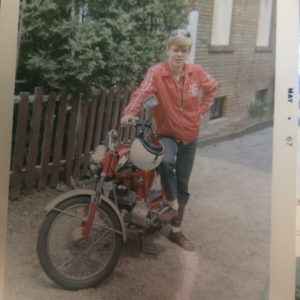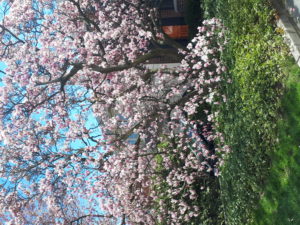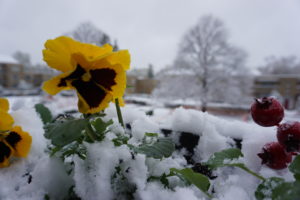April 23: I am a child of privilege. In the great coin-toss of conception, I was granted perhaps the greatest privilege of all: I was born male. I was raised in a solid family in a quiet neighbourhood. I went to good schools and was surrounded by classmates and friends who were positive roll-models. I got a post-secondary education and got a job in the public sector. It gave me job security, a good wage, health-care benefits and a pension. My parents provided me with financial security and a mortgage to buy my first house. When they died, an inheritance provided the wherewithal to live an extremely comfortable life with many benefits I would not otherwise afford. Now retired, I live in a 2 bedroom apartment in central Toronto. It’s been renovated and gives me more space than I really need. The neighbourhood is extremely well-off and full of people just like me.
Across the street is a Valu-Mart supermarket. It’s part of the Loblaw empire and it provides most of the convenience shopping for the neighbourhood. I worked my first full-time job in that store, putting cans on the shelf for $86 a week take-home (about $650 in 2021 dollars). It didn’t take long for me to figure out that unless I got motivated to improve the situation, this job would become a dead-end. With the privilege of my background, I had options. Others were not so fortunate and today, front-line grocery workers bear the brunt of COVID infections with minimal protections in place.
Of all the impacts arising from the pandemic, surely one of the most corrosive is the continued entrenchment of privilege at the disadvantage of those who are less fortunate. This has been aided and abetted by governments and corporations that are run by and for those of us with privilege. In spite of recent improvements, the vast majority of those in public office continue to be white, middle-class males. They govern for people just like them: well-connected, well-off men who are mostly well-insulated from the sort of difficulties many families face every day.
Doug Ford comes from a “political dynasty” begun by his Father. Like me, I don’t think he’s ever missed a meal unless by choice, and I doubt he has much experience schlepping kids to the daycare. His government has consistently made “political” decisions, choosing to placate citizens and corporations rather than implementing stronger measures that have consistently been recommended by health-care professionals. The clear effect of his confused and inept response has been to benefit those like himself, at the expense of those less well-off and able to protect themselves because they work indoors, in crowded environments, and live in large, multi-generational families. Most of these folks await a vaccination to protect themselves while I live alone, shop once a week, and have had vaccination for 2 weeks.
Justin Trudeau – a child of privilege if there ever was one – hasn’t done much better. Faced with a staggering economy at the outset of the pandemic, his government provided income supports for those affected by the shutdown. This was perhaps laudable at the time, but the benefit targeted the wrong people. The outcome was that personal savings in Canada, which averaged 7.74 percent from 1961 until 2020, reached an all time high of 28.20 percent in the second quarter of 2020. Families that clearly didn’t need any help benefitted, while others continue to struggle to make ends meet.
A benefit widely recommended by health care advisors is a wage supplement that would pay workers for time off to get tested, to isolate, or to recover from COVID infections. This appears to be shared responsibility of the Provinces and the Federal government yet neither is in any rush to fix it because those most affected live in racialized communities and have little political power. They are not like us.
Privileged members of Canada’s Corporate sector have also fared very well during the pandemic. Last week we learned that executives at Chartwell Homes voted themselves significant pay hikes. To quote the Globe and Mail: “The company said it responded effectively to the COVID-19 pandemic and gave itself perfect scores for employee engagement, customer satisfaction and its reputation with the public. The corporate scorecard meant Chartwell paid out bonuses a higher level of its target goals than it did in 2019. Chartwell paid all four of its top executives in excess of $1-million, and each of the four received bigger bonuses than in 2019, when they served in lesser roles.”
A report by Press Progress (January 21,2021) noted that “in December, CBC News reported Chartwell Homes had 4.6 deaths per 100 beds, among the highest average death rates in Canada. While that was lower than some other for-profit LTC companies, it’s significantly above the municipally-owned average of 1.4. The Ontario government’s Science Advisory Table acknowledges “ownership” is a factor driving the conditions that increase deaths. Other experts note the drive for profits in private healthcare can push companies to understaff and crowd facilities, increasing profits at the risk of health. In the case of Chartwell’s 23 Ontario for-profit homes, only three managed to clear 2020 without any non-compliance orders. The remainder averaged 4.3 orders per home, with some accounting for significantly more.”
As a reminder, former-Premier Mike Harris is a member of the Chartwell board. As Premier, he facilitated the transfer of Long Term Care homes to private entities on a for-profit basis. He reportedly holds almost $6 million in company shares and was granted $223,000 in fees last year for attending corporate meetings. At one of those meetings, the Chartwell board rejected a shareholder initiative to explore creating a “living wage” for employees calling it an “inefficient use of resources” and an “over-simplification”. A wage that would provide sufficient funds to support a family in the community would “oversimplify the process used to set compensation and restrict its competitive flexibility.” So the company has the flexibility to pay only a minimum wage to its’ employees, provided the Board members get 100% of their bonus.
Unfortunately, where all of this takes us is to a society increasingly separated by race and wealth. Communities like mine are doing remarkably well while others are less well-off. Neighbourhoods where front-line and essential workers reside have been increasingly marginalized in dense communities that have become hot-spots for the virus. They don’t have the privilege of political power and friends in high places and they are paying a huge price for our comfortable and convenient lifestyle. If there was one thing that “growing back better” from this horrible pandemic might have accomplished it should have been acknowledging the contributions of all sectors of our society and establishing mechanisms to ensure that nobody is diminished and left behind. Sadly, it seems that this will not be the case. Privilege has triumphed once again .

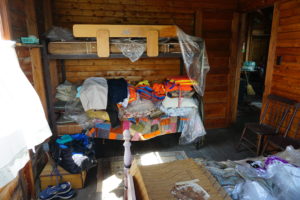

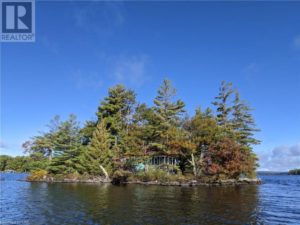

 May 21: I sold my beloved Honda VFR motorcycle this morning. I’ve been riding bikes for 45 years and owned her for 18 of them. She was the last in a long line of machines that extends back to the 1967 Yamaha 100 Twin that was my first bike. In the interim there have been larger Yamahas, Hondas, a BMW and a Moto Guzzi. I’ve enjoyed them all – some more than others – but the time has come to step back from riding.
May 21: I sold my beloved Honda VFR motorcycle this morning. I’ve been riding bikes for 45 years and owned her for 18 of them. She was the last in a long line of machines that extends back to the 1967 Yamaha 100 Twin that was my first bike. In the interim there have been larger Yamahas, Hondas, a BMW and a Moto Guzzi. I’ve enjoyed them all – some more than others – but the time has come to step back from riding.